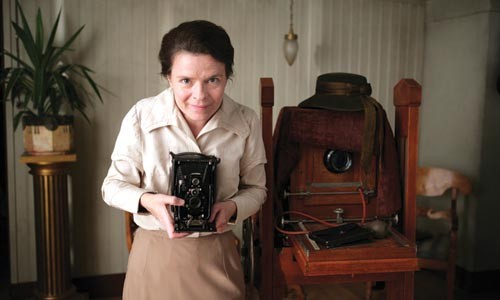Early in Jan Troell's Everlasting Moments, I began to think about why people who still love each other nonetheless drift apart. Or maybe it's the other way around: Why do people who don't love each other any more stay together?
This is all too profound to resolve right now, although it's certainly something to ponder. So is Everlasting Moments, a temperate drama with the redolence of the familiar -- part Ibsen, part Bergman, and not a whiff of Dogme, the Danish cinema movement that eschewed prettified things in favor of doing it raw.
Troell is Swedish, and so is his setting, although his characters are of mixed origins. Maria (Maria Heiskanen) is Finnish by birth, now married to Sigfrid (Mikael Persbrandt) and living in his native Sweden in the early 20th century. They meet cute, you might say: He loans her money to enter a contest, and she wins a camera, which he claims is justly his. So she says he can have it if he marries her, and he does.
Once the couple is joined in everlasting union, the kids start coming, and the camera get relegated to the bottom of a trunk. Sigfrid is a laborer and a drinker. He perpetually promises to stop, but he can't resist a proffer at the local pub. He beats Maria on occasion, when he's drunk, and he plays the accordion when he's sober. This makes the tattooed waves on his back wiggle and sway, and Maria and the children dance along with them.
Finally, though, Maria rediscovers her camera, and Everlasting Moments moves from the quietly conventional to the quietly philosophical. Nothing in Troell's film rises much above the volume of normal conversation: There are few tears and little laughter, and when death comes, as it does, it's silent and still, nothing more.
Cameras are new to people of this place and time (1907 and onward), and people who want their pictures taken go to Pedersen (Jesper Christensen), the town photographer and a native Dane. He recognizes Maria's eye for an image and encourages her.
Of course, her photographs tell stories about the milieu in which she lives, and as the 20th century emerges, the family enters the middle class. So why doesn't she make a living from this? Why does the camera drift in and out of her life in the decades that follow? Once again, time and place: With seven children to raise, she has a load of everlasting responsibility, and little opportunity to become Hedda Gabler.
You don't need a Ph.D. to extract themes from this -- to understand that these still and moving images transform our lives and our culture. So Everlasting Moments (the title refers as much to memory as to photography) is art cinema light: handsome, thoughtful, and with just enough heft to get you through dinner conversation afterward. While I've always welcomed the melancholy of Nordic cinema -- the more Bergmanic, the better -- Troell's film often feels too reserved, more Masterpiece Theater than celluloid Strindberg.
Maria's eldest daughter narrates the family's life matter-of-factly, and rare is the line in Troell's modest screenplay that's more than simply literal. When Sigfrid tells Maria that pictures are taking over her life, and that she's forgetting she's a mother, we know that the camera is actually saving it and allowing her to be one. In time, she speaks up for herself, sometimes with a knife at her throat, and the last thing we see her do is set free a moth trapped against a glass door. There must be a metaphor for that. In Swedish, with subtitles.

Starts Fri., May 1. Manor















